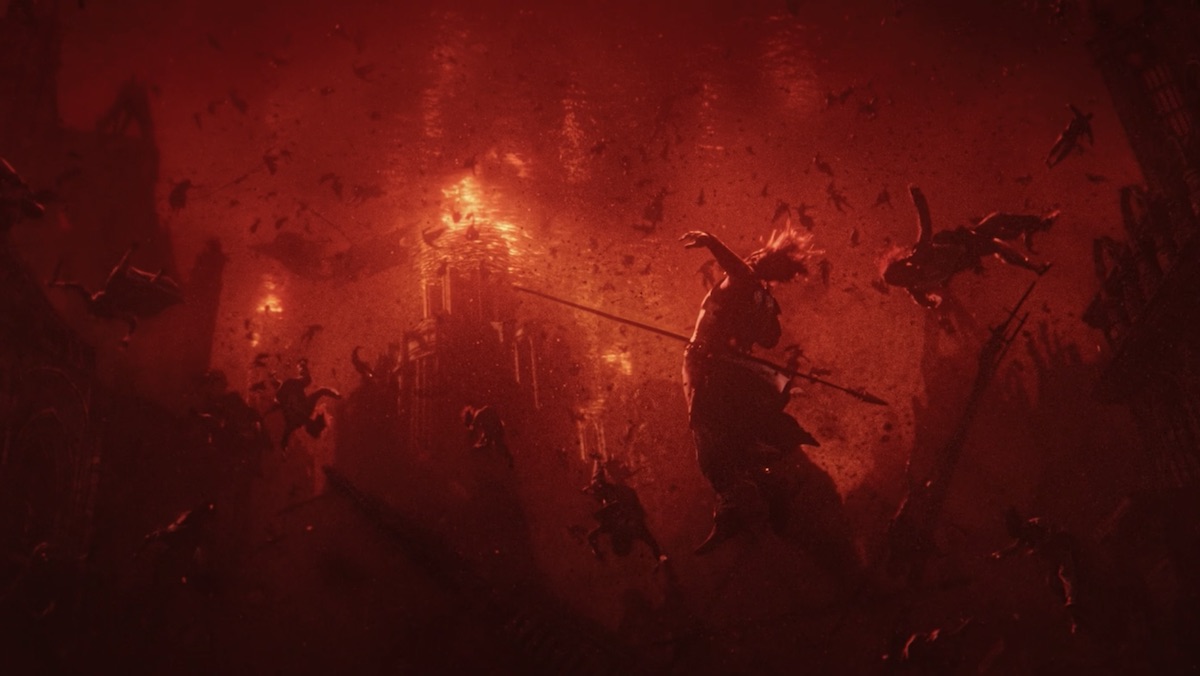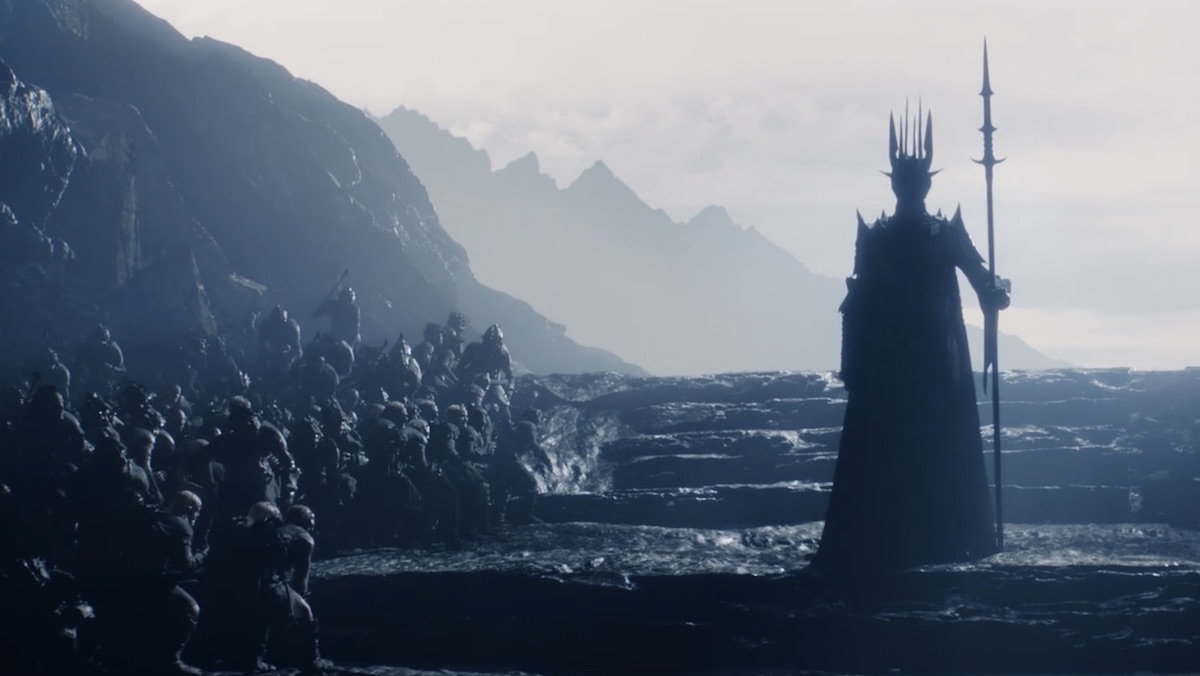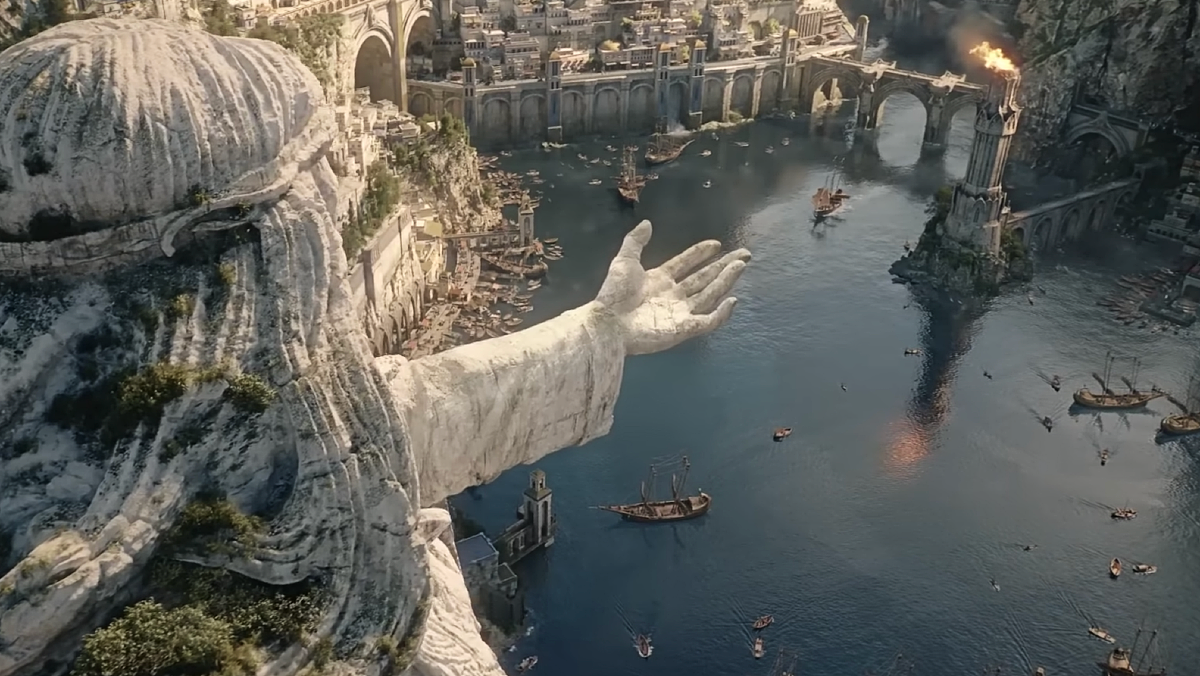The Rings of Power takes place during Middle-earth’s Second Age, but episode three made clear no one has forgotten about how the last age ended. The War of Wrath looms over every plot and character on the show. But what exactly was the Great Battle and why does the vanquished Morgoth remain on the mind of his former foes and allies alike? Because even though the world’s first Dark Lord fell in defeat, the evil he brought to the world still lives. Just as he planned.
Who Was Morgoth?

The supreme being of J.R.R. Tolkien’s universe is Eru Ilúvatar. That all-powerful deity created everything, including the 14 Valar who shaped and designed the world (called Arda). The most powerful and wisest of the Valar was Morgoth, first known as Melkor.
Morgoth is responsible for all discord in the world, as well as all its evil. He was the original Dark Lord of Middle-earth and reigned during the First Age. For centuries elves fought against Morgoth, most notably during five major battles. During the fifth, known as the “Battle of Unnumbered Tears,” Morgoth turned a near defeat into almost total victory.
What Was “The War of Wrath?”

When all hope was nearly lost for elves, men, and dwarves, the half-elf Eärendil traveled to Valinor to plead with the Valar for aide. Only then did the Valar finally come to Middle-earth to oppose Morgoth. The ensuing War of Wrath was an epic struggle lasting more than 40 years. It resulted in unimaginable death and destruction, which Galadriel saw firsthand.
The Valar ultimately won the Great Battle. They beheaded and banished Morgoth through the Door of Night into the Timeless Void outside the world, ending the First Age.

But while Morgoth lost, the evil he spread on Middle-earth remained. All of the lies and deceptions he fed men and elves remained behind, poisoning both for future generations.
Sauron: Morgoth’s Most Loyal Servant and Backup Plan
Morgoth’s most powerful servant was his loyal lieutenant Sauron, a supreme being himself. Sauron was one of the Maiar, spirit servants of the Valar. (Wizards are also Maiar.) During the First Age Sauron killed and marked Galadriel’s brother Finrod.

Despite his status as Morgoth’s cruelest soldier, Sauron did not play a role in the War of Wrath. (He might have been hiding from his master following a defeat). When Morgoth fell, Sauron fled the Valar’s judgment and hid in Middle-earth for centuries. The Rings of Power showed he remained in the shadows for so long most believed the world free of evil entirely.
Now the series’ third episode has revealed Morgoth made sure his demise would not end his mission. That old parchment with the “Black Speech” and Sauron’s symbol revealed Morgoth made plans for his servant to resume the war should Morgoth fall. And Sauron will operate from the Southlands, far from where Morgoth once reigned in the north. That’s why Galadriel was hunting north not south, and why orcs needed a map.
What Are the Orcs Digging For?

Sauron and his werewolves are not the only remaining members of Morgoth’s army. Balrogs, trolls, and dragons fled into darkness. As did orcs, who made up much of Morgoth’s forces. Though J.R.R. Tolkien’s own writings offer contradictory stories, at the very least orcs appear to come from captured elves Morgoth twisted into soldiers of evil.
Orcs are now loyal to Middle-earth’s second Dark Lord. (Who may or may not be their revered leader Adar which means “father” in Elvish.) They’re enslaving men and elves to dig in the ground. Whatever they seek likely comes from the First Age. Arondir thinks they’re looking for a weapon. If so, are they searching for one Morgoth used? One of Feanor’s lost silmarils that led to so much bloodshed? Or something else? Whatever they want, it’s likely a powerful relic from Morgoth’s reign.
But while the Great Battle left behind more than just orcs and a legacy of evil, it also resulted in new beauty.
The Creation of Númenor

Elves did not stand against Morgoth alone. Some tribes of men also stood with the Valar during the War of Wrath. The Valar then rewarded those men with a new island to call their own. They raised Númenor from the sea in the west, closest to the Valar’s own continent. Elros—the son of Eärendil who pleaded with the Valar to intervene against Morgoth—became Númenor’s first king. It was Elros who also built Númenor’s Hall of Law where Galadriel found Morgoth’s secret plan.
(The Valar had given Elros and his brother Elrond—both half human and half elf—a choice: they could live with men or elves. Elros chose men, Elrond elves.)

Thanks to their alliance against Morgoth and the familial connections, elves and Númenorans were once “like kin” as Galadriel said. That is until Númenor cut elves out of their life entirely. That animosity likely came from jealousy. The Valar granted Númenoreans a paradise, along with great physical stature and much longer lifespans than other men. But the Valar forbade them from sailing west to the Undying Lands. Elves had eternal life (in that they did not age or get sick), but Ilúvatar had given men the “gift” of death.
Not all men went to live among the grandeur of favored Númenor. But not all of them would have been welcomed anyway, for not all men had stood with the Valar.
The Men Who Stood with Morgoth

Morgoth spread evil among elves and men alike by poisoning them with lies and half-truths. His deceptions did more than earn him followers, though. They also ensured his influence on the world would endure even in his absence. And that influence runs strongest through men, who are more eaisly corrupted.
The men who fought with the Valar belonged to three houses (Bëor, Haladin, and Marach). Those who fought with Morgoth were known as the Easterlings (or “Swarthy Men”), and elves kept an eye on them long after the War of Wrath.

Galadriel says the symbol Halbrand wears around his neck—which he says he took from a dead man—is the symbol of the king who united tribes of the southlands during the First Age. But Halbrand warned her he is “not the hero” she seeks, because he is a descendant of the men who served Morgoth and lost the Great Battle. In fact, his ancestors swore a blood oath to the first Dark Lord. And a similar oath nearly destroyed the elves who left Valinor to chase after Morgoth in Middle-earth.
The Never-Ending War Against Evil

Morgoth is gone, but Sauron is raising a tower in the southlands to continue his master’s fight. He is Morgoth’s backup plan to create a realm where “evil would not only endure but thrive.” Because he knew evil will endure regardless, which is why good must always oppose it. The War of Wrath never truly ends.
Mikey Walsh is a staff writer at Nerdist. You can follow him on Twitter at @burgermike. And also anywhere someone is ranking the Targaryen kings.
The post Why Morgoth’s War of Wrath Matters So Much to THE RINGS OF POWER appeared first on Nerdist.


0 Comments